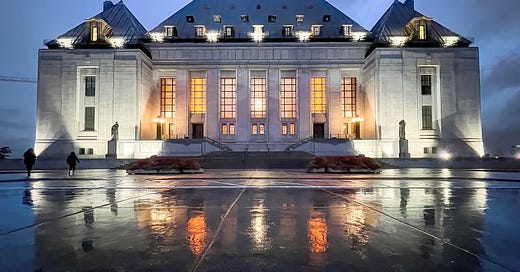Castle Law is as Canadian as maple syrup...
Like so many things frowned upon as American, Castle Law has deep Canadian roots.
Ontario Premier Doug Ford was recently calling for castle law to be implemented in Canada. He did this after a man in Vaughan, Ontario was charged for discharging a firearm as thugs tried to steal his car from his driveway.
“He should get a medal for standing up. It’s like down in the U.S. — we should have the castle law,” Ford said.
I’ll post the full epic rant by Ford below, he really goes off on judges and bail conditions and it’s worth watching, but…what you need to know about is a new column in the Toronto Sun from lawyer Marty Gobin.
Gobin points to two things that changed castle law doctrine in Canada. The Harper government’s decision to pass Bill C-26, dubbed the Citizen's Arrest and Self-defence Act a Supreme Court decision that would come years later.
Writes Gobin…
Then, in 2016, Peter Khill, a former member of the Canadian Forces, confronted and killed a criminal who snuck into Mr. Khill’s driveway and was breaking into Mr. Khill’s truck in a dark environment at 3:00 a.m. A jury unanimously voted to acquit Mr. Khill after he asserted he acted in self-defence.
On appeal, Justin Martin of the Supreme Court of Canada cited Bill C-26’s changes to the law and said that the jury should have been told to consider Mr. Khill’s “role” in the incident, stating, “Where an accused opts to stand their ground or, as in this case, advance while armed towards a perceived threat rather than de-escalating or reassessing the situation as new information becomes available, a trier of fact is entitled to account for this role when assessing the reasonableness of the accused’s ultimate act.”
Everything he puts in here is accurate, but we do need some context. So allow me, just a journalist and not a lawyer who has to appear before judges who are always touch about criticism, to provide that context.
The purpose of the Citizen's Arrest and Self-defence Act was to clarify that citizens had rights to self-defence despite what police officers, Crown prosecutors and judges were saying. Going back to The Lucky Moose Act and much likely well before, courts had been taking a dim view of any citizen exercising their right to protect themselves, their family or their property.
The Harper government wanted to move in the right direction, they just didn’t see Justice Sheilah Martin coming.
Justice Martin was appointed to the Supreme Court by Justin Trudeau in 2017 and has been a reliably liberal judge ever since. The law, as passed by Parliament, affirmed Mr. Khill’s right to use force to protect himself or his property, she simply interpreted the law differently and altered the will of Parliament from her unelected perch on the Supreme Court bench.
And with that, centuries of jurisprudence went out the window. In Canada, we don’t respect the hard fought rights that date back centuries, our judges look for avenues that make them feel good about themselves and their liberal views.
“The castle doctrine is an extension of the principle dating back to before Confederation that an ‘Englishman’s home is his castle,’” Gobin wrote.
I agree with Gobin, “Parliament should listen to Premier Ford and reverse this 12-year experiment in eliminating centuries of tradition in our legal system.” I just don’t trust the Liberal government of Mark Carney, with Sean Fraser as Justice Minister actually tackling this.
Now, back to that Ford rant that you should watch…






A castle law? I believe that Albertan secessionists hope to have one after we exit Canada.
While deployed overseas while in the CAF, we were told not to use lethal force to protect equipment unless it was deemed mission critical. This is to say, if a person or people (as is mostly the case) wanted to steal say, a Heavy Logistical Truck, we were told to allow them to have the equipment. A tough pill to swallow, but those were the rules - these rules were found in what was called Rules Of Engagement (ROEs) and the only people that knew the ROEs better than us, were the belligerents - they knew exactly how far they could go.